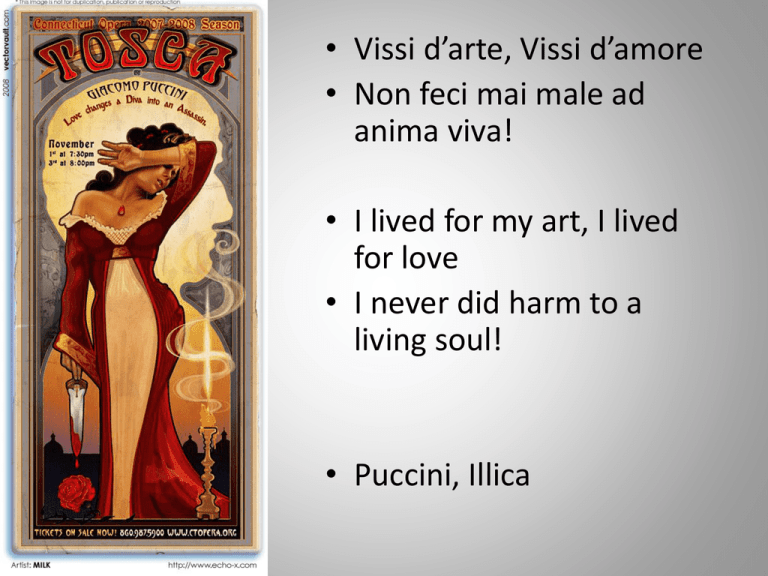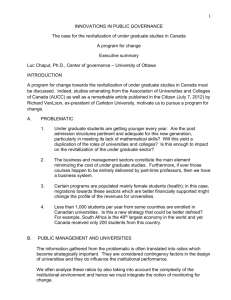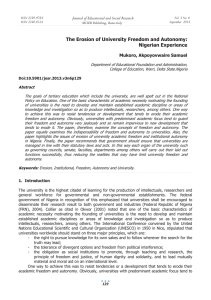Doug Short - ACIFA Presentation on Academic Freedom
advertisement

• Vissi d’arte, Vissi d’amore • Non feci mai male ad anima viva! • I lived for my art, I lived for love • I never did harm to a living soul! • Puccini, Illica Initial thoughts ACAD Suggestion that Lukaszuk join us in a redundancy meeting Academic Council meeting to start a conversation on academic freedom Start of a conversation What is academic freedom? Who thinks it is important? A little historical perspective Why might we be interested? Limits Threats Nuances Academic Freedom to teach, research and publish [to inquire] to criticize and help determine institutional policies to address public issues as citizens institutional autonomy in running its affairs for student choice in academic programs Criticism Art or act of judging against some standard Formulated opinion Detailed inquiry [merits, demerits; beauties, blemishes] “One who thinks otherwise” Pleasure in debate Academic Freedom essential to academy [disinterested inquiry] and society freedom to teach, present ideas and facts (including those inconvenient to special interest groups or authorities), without fear of repression, job or privilege loss MIT Policies and Procedures: 4.1 Teaching and Research “Not only does the Institute recognize outstanding contributions and achievements by appropriate salary advancement and promotion, but also by permitting faculty members substantial freedom in arranging their academic lives. This freedom is subject, however, to an overriding principle: The primary loyalty of a full-time member of the Faculty must be to the Institute at all times. This obligation underlies all others. “ “While fulfilling responsibilities to their students, the Institute, and their discipline, faculty members have a right, and the Institute has an obligation, to protect academic freedom in their classroom, in the expression of their ideas in the academic community, and in publishing and disseminating their work.” CAQC Handbook 3.7 ACADEMIC FREEDOM AND SCHOLARSHIP June 2006 As stated in its Key Operating Principles, Council respects the foundational role of academic freedom in the provision of high quality degree programs. Thus, Council requires that institutions meet its organizational assessment standards on academic freedom, institutional integrity, and scholarly and research activity. In making its recommendation to the Minister, the Postsecondary Learning Act (Appendix A) requires the Campus Alberta Quality Council to consider the ability (readiness) of institutions to deliver and sustain high quality degree. CAQC Handbook 3.7.1 ACADEMIC FREEDOM An institution must ensure that it maintains an atmosphere in which intellectual freedom exists. Although it is understood that an institution will be in reasonable harmony with its founding and sustaining organizations, a high degree of intellectual independence is expected of its academic staff and students. An institution’s academic staff and students must be free to examine and to test all knowledge appropriate to their disciplines as judged by the academic community in general. An institution must adopt and distribute to all members of the academic staff a statement of the principle of academic freedom as established by the governing board of the institution, assuring freedom in teaching, scholarship/research and publication (see below), and community activities. Written policy and procedures that ensure the principles of natural justice are followed in the event of alleged violations of the policy must be clearly stated, widely available, and actively followed. CAQC Handbook 3.7.2 INSTITUTIONAL INTEGRITY In general terms, the institution must recognize and protect the right of the individual to the honest search for knowledge, wherever knowledge is to be found, without fear of reprisals by the institution or by third parties. Academic freedom implies the right to communicate freely the acquired knowledge and the result of scholarship/research. It implies the duty, however, to respect the rights of others, to exercise that freedom in a reasonable and responsible manner, and to respect the academic objectives of the institution. Chapter 3 – Organizational Evaluation || CAQC Handbook www.caqc.gov.ab.ca 42 CAUT Policy Statement on Academic Freedom 1 Post-secondary educational institutions serve the common good of society through searching for, and disseminating, knowledge and understanding and through fostering independent thinking and expression in academic staff and students. Robust democracies require no less. These ends cannot be achieved without academic freedom. 2 Academic freedom includes the right, without restriction by prescribed doctrine, to freedom to teach and discuss; freedom to carry out research and disseminate and publish the results thereof; freedom to produce and perform creative works; freedom to engage in service to the institution and the community; freedom to express one's opinion about the institution, its administration, and the system in which one works; freedom to acquire, preserve, and provide access to documentary material in all formats; and freedom to participate in professional and representative academic bodies. Academic freedom always entails freedom from institutional censorship. 3 Academic freedom does not require neutrality on the part of the individual. Academic freedom makes intellectual discourse, critique, and commitment possible. All academic staff must have the right to fulfil their functions without reprisal or repression by the institution, the state, or any other source. Contracts which are silent on the matter of academic freedom do not entitle the employer to breach or threaten in any way the academic freedom of academic staff employed under such collective agreements or other employment contracts. CAUT Policy Statement on Academic Freedom 4 All academic staff have the right to freedom of thought, conscience, religion, expression, assembly, and association and the right to liberty and security of the person and freedom of movement. Academic staff must not be hindered or impeded in exercising their civil rights as individuals including the right to contribute to social change through free expression of opinion on matters of public interest. Academic staff must not suffer any institutional penalties because of the exercise of such rights. 5 Academic freedom requires that academic staff play a major role in the governance of the institution. Academic staff members shall constitute at least a majority on committees or collegial governing bodies responsible for academic matters including but not limited to curriculum, assessment procedures and standards, appointment, tenure and promotion. 6 Academic freedom must not be confused with institutional autonomy. Post-secondary institutions are autonomous to the extent that they can set policies independent of outside influence. That very autonomy can protect academic freedom from a hostile external environment, but it can also facilitate an internal assault on academic freedom. Academic freedom is a right of members of the academic staff, not of the institution. The employer shall not abridge academic freedom on any grounds, including claims of institutional autonomy. Approved by the CAUT Council, November 2011. AUCC Association of Universities and Colleges of Canada What is academic freedom? Academic freedom is the freedom to teach and conduct research in an academic environment. Academic freedom is fundamental to the mandate of universities to pursue truth, educate students and disseminate knowledge and understanding. In teaching, academic freedom is fundamental to the protection of the rights of the teacher to teach and of the student to learn. In research and scholarship, it is critical to advancing knowledge. Academic freedom includes the right to freely communicate knowledge and the results of research and scholarship. Unlike the broader concept of freedom of speech, academic freedom must be based on institutional integrity, rigorous standards for enquiry and institutional autonomy, which allows universities to set their research and educational priorities. AUCC Why is academic freedom important to Canada? Academic freedom does not exist for its own sake, but rather for important social purposes. Academic freedom is essential to the role of universities in a democratic society. Universities are committed to the pursuit of truth and its communication to others, including students and the broader community. To do this, faculty must be free to take intellectual risks and tackle controversial subjects in their teaching, research and scholarship. For Canadians, it is important to know that views expressed by faculty are based on solid research, data and evidence, and that universities are autonomous and responsible institutions committed to the principles of integrity. AUCC The responsibilities of academic freedom Evidence and truth are the guiding principles for universities and the community of scholars that make up their faculty and students. Thus, academic freedom must be based on reasoned discourse, rigorous extensive research and scholarship, and peer review. Academic freedom is constrained by the professional standards of the relevant discipline and the responsibility of the institution to organize its academic mission. The insistence on professional standards speaks to the rigor of the enquiry and not to its outcome. The constraint of institutional requirements recognizes simply that the academic mission, like other work, has to be organized according to institutional needs. This includes the institution’s responsibility to select and appoint faculty and staff, to admit and discipline students, to establish and control curriculum, to make organizational arrangements for the conduct of academic work, to certify completion of a program and to grant degrees. AUCC Roles and responsibilities University leadership: It is a major responsibility of university governing bodies and senior officers to protect and promote academic freedom. This includes ensuring that funding and other partnerships do not interfere with autonomy in deciding what is studied and how. Canada’s university presidents must play a leadership role in communicating the values around academic freedom to internal and external stakeholders. The university must also defend academic freedom against interpretations that are excessive or too loose, and the claims that may spring from such definitions. To ensure and protect academic freedom, universities must be autonomous, with their governing bodies committed to integrity and free to act in the institution’s best interests. Universities must also ensure that the rights and freedoms of others are respected, and that academic freedom is exercised in a reasonable and responsible manner. Faculty: Faculty must be committed to the highest ethical standards in their teaching and research. They must be free to examine data, question assumptions and be guided by evidence. Faculty have an equal responsibility to submit their knowledge and claims to rigorous and public review by peers who are experts in the subject matter under consideration and to ground their arguments in the best available evidence. Faculty members and university leaders have an obligation to ensure that students’ human rights are respected and that they are encouraged to pursue their education according to the principles of academic freedom. Faculty also share with university leadership the responsibility of ensuring that pressures from funding and other types of partnerships do not unduly influence the intellectual work of the university History Socrates Hemlock and corrupting youth through teachings History University of Bologna Constitutio Habita , about 1158, guaranteed right of scholars to travel freely History Enlightenment [Germaine de Stael, Wilhelm von Humboldt, John Stuart Mill – On Liberty] Germany [Lehrfreiheit (teach), Lernfreiheit* (study)] U.S. Research universities – achievement trumps personal beliefs U.S. right of free speech British tradition of academic free speech, political involvement, self government Canada –early role for clergy, leaders of society [morality] History Fusing of graduate schools, undergraduate colleges [??] Harvard College 1636, with 1st degree in 1642, from residential college to University with growth, higher faculties Starts as small religious affiliations, with liberal arts education at the undergraduate level College of William and Mary – Royal Charter Dartmouth College University of California, Berkley from College of California and Agricultural, Mining and Mechanical Arts College 1853 Trinity College absorbed by University of Toronto (still grants degrees through Faculty of Divinity) History Americans added the context of engaged citizens, and implied intramural expression by early 20th century In Canada [1958 Harry Crowe dismissal by United College] Fowke-Laskin investigation held that academic freedom included freedom to criticize the employer, should not be limited by institutions religious aims Supreme Court [1967]under Chief Justice Warren noted that academic freedom is: ‘a special concern of the first amendment, which does not tolerate laws that cast a pall of orthodoxy over the classroom.” Budapest University of Technology and Economics (1782) Colleges, Polytechnics Community colleges evolved in Canada between 1960 and 1975 Training needs of business, industry, public sector Polytechnics [higher and/or vocational education] PITA (1916)[motor mechanics, metalworking; hospital facility, teacher training, RC Air Force (1940), apprenticeship (1948), ACAD (1985)] to SAIT and NAIT (1959) Ryerson (1948) from training and re-establishment institute to polytechnic (1966) to university (1971) BCIT (1960) as vocational training Propelling business innovation, creating jobs for tomorrow Multi-skilled, multi-disciplined and industryresponsive Solutions to industry problems, accelerating knowledge transfer Limits Cannot limit others academic freedom Professional codes of ethical conduct Collective agreements Illegal acts, defamation, lack of effort Civility Validation of courses by academic bodies Threats Exclusivity of a truth, orthodoxy versus emerging theory – Need challenges for innovation Idea of waste implied by ‘idle curiosity’ Acceptance in principle, not in practice Church, state, governing body, parent interference or control Political correctness Threats Neo-liberalism all human activity governed by pure competition, smaller public sector Flexibility, nimbleness, responsibility (New College, Oxford) Queen’s University (Mason), U of T (Olivieri) Mason: long and distinguished career (imperialism and neo-colonialism), verbatim transcript from hearing on Pearl Harbour (“towel head,” “japs” and “little yellow sons of bitches,”), students suggested classroom was not a “safe” environment, Mason suspended Olivieri: haematologist and researcher UofT, Apotex, evidence of toxicity, confidentiality Nuances CAUT Annual Conference on Academic Freedom “Professional norms” Foundation is continual exposure to criticism, systematic empirical inquiry Concern for speaking outside one’s discipline [interconnectedness] Institutional autonomy Religious belief [faith tests] Equity [discrimination, harassment, bullying] The law [contempt of law, confidentiality] Growth of University-Industry collaborations Our concerns? Moodle (closed curriculum: content) Prescribed assessments Instructors (engaged – doctrinal) MOOCs (massive open online course) Secrecy, spin, fear of critiquing Advanced Education mandates References • Michiel Horn, Academic Freedom in Canada: A History, University of Toronto Press, Toronto,1999. Thoughts!









